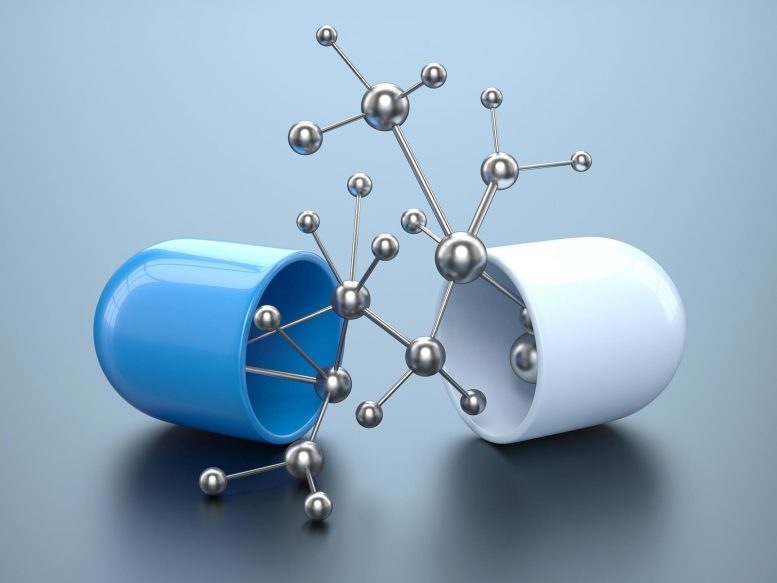
A small molecule shows promise in making cancer immunotherapy affordable and accessible by targeting PD-1/PD-L1 proteins.
A small molecule that could be a more accessible and effective alternative to an antibody that is successfully used to treat a range of cancers has been identified and synthesized by scientists at Tel Aviv University and the University of Lisbon. The results of the study were published in the Journal for ImmunoTherapy of Cancer.
Behind the groundbreaking development is an international team of researchers. They were led by Prof. Ronit Sachi-Fainaro, Head of the Center for Cancer Biology Research and Head of the Laboratory for Cancer Research and Nanomedicine at the Sackler Faculty of Medicine, Tel Aviv University, and Prof. Helena Florindo and Prof. Rita Guedes from the Research Institute for Medicines at the Faculty of Pharmacy, University of Lisbon.
“In 2018, the Nobel Prize in Medicine was awarded to James Allison and Tasuku Honjo for their contribution to the study of immunotherapy, the treatment of cancer through activation of the immune system,” says Prof. Satchi-Fainaro, a 2020 Kadar Family Award recipient. “Honjo discovered that immune cells called T cells express the protein PD-1 that disables the T-cells’ own activity when it binds to the protein PD-L1 expressed in cancer cells. In fact, the interaction between PD-1 and PD-L1 allows cancer cells to paralyze the T cells, preventing them from attacking the cancer cells. Honjo developed antibodies that neutralize either PD-1 or PD-L1, thereby releasing the T cells to fight cancer effectively.”
Molecular docking of ligand candidates on PD-L1 protein structure. Credit: Dr. Rita Acúrcio
The clinical use of antibodies against the PD-1/PD-L1 proteins has already been authorized, and they are regarded as holding the greatest potential for the battle against cancer. This immunotherapy can drastically improve patient outcomes, without the severe side effects that accompany treatments such as chemotherapy.
Small Molecule Offers More Affordable and Accessible Cancer Treatment
However, the antibodies are expensive to produce, and therefore not available to all patients. Furthermore, the treatment does not affect all parts of the solid tumors because the antibodies are too large to penetrate and reach less accessible and less exposed areas of the tumor. Now, scientists at Tel Aviv University and the University of Lisbon have used bioinformatic and data analysis tools to find a smaller, smarter alternative to these antibodies.

“Post-doctoral researcher Dr. Rita Acúrcio started with thousands of molecular structures, and by using computer-aided drug design (CADD) models and databases, we narrowed down the list of candidates until we reached the best structure,” says Prof. Satchi-Fainaro. “In the second stage, we confirmed that the small molecule controls tumor growth as effectively as the antibodies – it inhibits PD-L1 in animals engineered to have human T cells. In other words, we have developed a molecule that can inhibit PD-1/PD-L1 binding and remind the immune system that it needs to attack the cancer.
Advantages of the Small Molecule Over Antibodies
“Moreover, the new molecule has some major advantages over the antibody treatment. First of all, the cost: since the antibody is a biological rather than a synthetic molecule, it requires a complex infrastructure and considerable funds to produce, costing about $200,000 per year per patient. In contrast, we have already synthesized the small molecule with simple equipment, in a short time and at a fraction of the cost. Another advantage of the small molecule is that patients will probably be able to take it at home, orally, without the need for IV administration in the hospital.”
In addition to accessibility considerations, experiments show that the small molecule improves the activation of immune cells inside the solid tumor mass.
“The surface area of a solid tumor is heterogeneous,” explains Prof. Satchi-Fainaro. “If there are fewer blood vessels in a particular area of the tumor, the antibody will not be able to get inside. The small molecule, on the other hand, diffuses, and is therefore not entirely dependent on the tumor’s blood vessels or on its hyperpermeability. I believe that in the future, the small molecule will be commercially available and will make immunotherapy affordable for cancer patients.”
Reference: “Therapeutic targeting of PD-1/PD-L1 blockade by novel small-molecule inhibitors recruits cytotoxic T cells into solid tumor microenvironment” by Rita C. Acúrcio, Sabina Pozzi, Barbara Carreira, Marta Pojo, Nuria Gómez-Cebrián, Sandra Casimiro, Adelaide Fernandes, Andreia Barateiro, Vitor Farricha, Joaquim Brito, Ana Paula Leandro, Jorge A R Salvador, Luís Graça, Leonor Puchades-Carrasco, Luís Costa, Ronit Satchi-Fainaro, Rita C. Guedes and Helena F. Florindo, 21 July 2022, Journal for ImmunoTherapy of Cancer.
DOI: 10.1136/jitc-2022-004695
This work was supported by Fundação para a Ciência e a Tecnologia, Ministério da Ciência, Tecnologia e Ensino Superior (FCT-MCTES), by The Israeli Ministry of Health under the frame of EuroNanoMed-II, “La Caixa” Foundation, Liga Portuguesa Contra o Cancro, the ERC, The Israel Science Foundation, The Melanoma Research Alliance, the Israel Cancer Research Fund (ICRF) Professorship award and the Morris Kahn Foundation.
Never miss a breakthrough: Join the SciTechDaily newsletter.